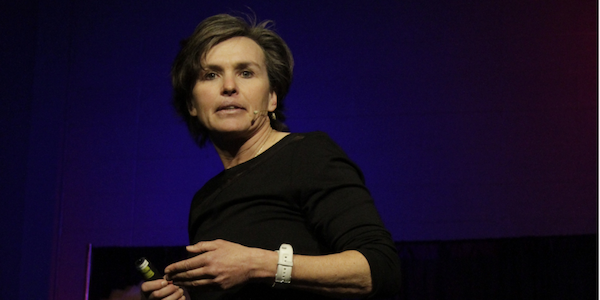Leah Goldstein was supposed to speak today at an International Women’s Day event but her invitation was rescinded. (photo from Leah Goldstein)
Leah Goldstein, a BC woman who is a professional road-racing cyclist and inspirational speaker, was supposed to be sharing her story with an audience in Peterborough, Ont., today, International Women’s Day. Instead, first she, then the event itself, was canceled, a byproduct of tensions around the Israel-Hamas war and its overflow into domestic affairs in Canada and around the world.
Goldstein, who lives in Vernon, was told her invitation to share her story – one of resilience and recovery following a devastating 2005 road accident that nearly ended her career – had been rescinded by the group organizing the IWD event in the city northeast of Toronto. The event had become the target of protests and threats after local activists learned of Goldstein’s service in the Israeli military.
“Their sponsor threatened to pull support after receiving threats from a small group of activists,” Goldstein told the Independent.
Goldstein spent most of her 20s first in the Israel Defence Forces teaching the martial art krav maga, then in elite Israeli spy and police agencies.
“I was made in Israel,” Goldstein said. “I was born in Canada.” The family made aliyah when Goldstein was a child, and she has dual Canadian and Israeli citizenship.
Perhaps in keeping with her martial arts background, Goldstein pulls no punches over her cancelation. In the climate since the start of the war, in October, it is not just Israelis who are being targeted, she said, but Jews.
“It’s not the IDF or whatever,” she said. “Even if I didn’t serve in the IDF, I still question whether they would’ve had me present.”
If the shoe were on the other foot, Goldstein said she would have no problem listening to a person with a different perspective.
“I can promise you this, though. If I were a Palestinian woman, I would not have been canceled,” she said. “As a Jewish woman, I would also not be offended listening to a Palestinian woman talking about her life. Why would I be offended?”
Whatever caused the organizers to disinvite her, whether her identity or the fact of her military background, Goldstein said, the content of her presentation would not have been controversial.
 “I’m not political,” she said. “I’ve been speaking for 11 years. Not one time has anyone ever come up to me, my manager or the organization I work for and said they felt offended by anything I said. Not one time in 11 years. I speak about my athletic career, about my crashes, my recovery, some of the hardships that many women go through. That’s it.”
“I’m not political,” she said. “I’ve been speaking for 11 years. Not one time has anyone ever come up to me, my manager or the organization I work for and said they felt offended by anything I said. Not one time in 11 years. I speak about my athletic career, about my crashes, my recovery, some of the hardships that many women go through. That’s it.”
By focusing on her past, rather than her current message, Goldstein said, it is other people who are making Israel and Palestine an issue.
“They are almost forcing me to be political by making a comment or a statement,” she said.
Goldstein’s story is one of literally too many to keep track of recently, with anti-Israel activists targeting individuals, groups and businesses for cancelation or boycotts. In some cases – the defacing of a statue in Toronto of the late Canadian Jewish actor Al Waxman with Palestinian slogans – there is no pretence that the target is Israel rather than Jews.
Here in Canada, recently, other incidents are just this side of plausible deniability of overt antisemitism.
An anti-Israel march through the streets of Toronto took a moment to linger outside Mount Sinai Hospital chanting for “intifada.” After condemnations from Toronto’s mayor, Canada’s prime minister and other top officials, protest organizers insisted there was no antisemitic intent in targeting a hospital with a Jewish name founded by Jewish doctors.
“[Mount Sinai Hospital] just happens to be along our regular rally route, which we pass by on a usual basis, as we head to rally in front of the U.S. consulate,” they said in a statement.
If any form of racism was at play, they insisted, it was on the other side.
“The irony is that portraying the raising of the Palestinian flag as a hate-motivated act of antisemitism is itself perpetuating anti-Palestinian racism,” they contended.
Days later, an anti-Israel rally at McGill University in Montreal blockaded the Samuel Bronfman Building on campus, home of the university’s management department, accusing the faculty of a “long history of complicity in the occupation of Palestine.” The choice of location had nothing to do with the famous Jewish name plastered on the front of the building, they said.
Closer to home, Muslim organizations in British Columbia threatened that representatives of the NDP provincial government would not be permitted in Muslim spaces as long as Selina Robinson remained in cabinet because she made an offhanded remark about the arability of desert land three-quarters of a century ago. As one of the country’s most prominent (and only) Jewish elected officials and one who has unashamedly defended Israel, Robinson’s expulsion was a big coup for the activists.
These are all of a piece with similar reported events and, doubtlessly, many more such incidents unreported.
The Jewish-American singer (American, note, not Israeli) Matisyahu is currently in the midst of a kerfuffle in which concerts in Arizona and New Mexico were canceled. The venues assured the public that the concerts were canceled because of security concerns and short staffing, not because he’s a Jew.
Comedian Jerry Seinfeld was recently subjected to chants of “genocide supporter” and “Nazi scum” while leaving the State of World Jewry address by author Bari Weiss at New York’s 92nd Street Y. He got, perhaps, a better sense of the state of world Jewry outside the event than he did inside.
The group Art Not Genocide Alliance is calling to exclude Israel from this year’s 60th Venice Biennale. Officials at the Eurovision Song Contest are fine-tooth-combing this year’s Israeli entry to make sure there are no hidden political messages. Soccer governing bodies from 12 countries – almost all of them among the world’s worst human rights violators – are calling for Israeli teams to be excluded from FIFA, the international football entity.
In each of these instances, there is an argument to be made that the targets were not chosen because they are Jews (or are institutions founded or funded by Jews) but because they were at a Zionist event, or they made an impolitic remark or the people in the building are guilty of some unspecified Zionist infraction. This, though, is to unjustly justify their actions.
Whether Israel is being fairly or unfairly untreated is not the point here. Goldstein’s cancelation and the raft of similar examples are not targeting a country but Jewish individuals and entities. Yes, we are assured, these Jewish individuals and entities are also Zionist people and groups, a differentiation that is presumed to excuse this extraordinary singling out. Yet, we do not see performing artists from China, a country that is holding hundreds of thousands of Muslims in concentration camps, denied admission to Canadian or European cultural festivals. Citizens of Saudi Arabia, which holds mass public executions and subjugates the female half of the population, is not excluded from world soccer events. Citizens of the 50 or so other countries in the world that (unlike Israel) are categorized as “not free” or “partly free” are not subjected to slanders on the streets of New York or banned from speaking in Peterborough.
Never mind human rights abominations like North Korea or Iran. The brutalities perpetrated by their governments are almost entirely ignored by commentators and activists fixated on Israel. Again, though, that is only part of the problem. What we are seeing here is not an attack on official representatives of those countries. Rather, it is akin to screaming at people leaving an exhibition of Iranian art or boycotting a Chinese-Canadian-owned business. It is the sort of guilt by proxy that led apparently millions of otherwise decent Canadians to see little wrong in interning “enemy aliens” during wartime – except even that parallel fails because Canada is not at war with Israel but has longstanding and justifiably friendly relations and shared values with that country.
Agree or not with the approach, movements targeting a country and its official representatives operate in a realm of legitimate political discourse. There is something parallel but significantly different happening here. People and organizations perceived even remotely as associated with Israel are being targeted for boycotts – in some cases, to all appearances, merely being Jewish is enough to earn condemnation and cancelation. This is a textbook case (well, a codified illustration) of antisemitism.
Holding Jews collectively responsible for actions of the state of Israel is one of the examples accompanying the International Holocaust Remembrance Alliance Working Definition of Antisemitism. This is largely moot, though, because the very people who employ these tactics explicitly reject the definition because it is accompanied by precisely examples like these. (If you don’t like being accused of xyz, redefine the meaning of xyz.)
Ultimately, there is no way to prove motivation. We can say the people shouting outside a Jewish hospital or calling Seinfeld “Nazi scum” are antisemitic, they can say they’re not, and no one is any further ahead.
There is something irrefutable, though. The Overton window, the spectrum of ideas that are deemed acceptable in a political discussion, is widening. Every time a Jewish speaker is targeted or a Jewish singer is subjected to cancelation and the public responds with a yawn, the bounds of what is acceptable broadens. It is by no means hyperbolic to suggest that this is precisely the way a society begins a slide into despotism or mob rule.
The context or content of the complaints cease to really matter. Organizations issue diktats demanding the ouster of a Jewish politician, thugs threaten to disrupt a concert, a religious group threatens a governing party’s standing in a few swing ridings and political leaders, event producers and concert venues capitulate. Pretty soon, activists and malcontents of all sorts see that threatening violence or boycotts is the easiest way to silence their targets because middle-of-the-road people fold instantly behind valid concerns for safety.
Motivation and intent probably matter less than outcome. These targetings have the effect of isolating, sidelining and menacing Jewish people – call them Jews, call them Zionists, call them whatever.
This is, without overstatement, a dangerous threat to bedrock ideas of a democratic society.

